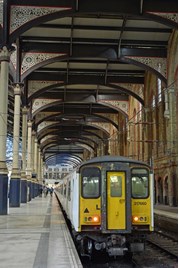 Read the peer reviews for this feature.
Read the peer reviews for this feature.
Download the graphs for this feature.
As the nation settles down to five unexpected years of Conservative majority rule, it would not be controversial to say that there is an element of relief among senior figures in the rail industry - not least because of the continuity in government policy, but also because the ministerial top team has barely changed.
Patrick McLoughlin remains as Secretary of State for Transport - he took over the post in September 2012, making him already the third longest incumbent in the past 20 years. Only John Prescott (1997-2001) and Alistair Darling (2002-2006) served longer.
Meanwhile, at Parliamentary Under-Secretary of State level, Claire Perry continues as rail minister, albeit with the responsibility for freight handed to Robert Goodwill. Both are respected by the industry and are thought to have effectively batted for its corner so far - although the outcome of the next Spending Review may change that perception.
Baroness Kramer has left the government as a result of the electoral crushing of the Liberal Democrats (and hence the redundancy of the need for another coalition). But Harrogate and Knaresborough MP Andrew Jones has joined the Department, with specific responsibility for the refranchising of Northern and TransPennine, and for electrification (having served on the Northern Electrification Task Force).
On a similarly continuous note, the transport team at the opposition has remained unchanged. With Labour’s leadership contest not set to come to an ultimate conclusion until September, it will be several months before any new leader can appoint a new Shadow Cabinet. As a result, the abrasive Michael Dugher (Barnsley East) has retained his role as Shadow Transport Secretary, while the well-briefed Lillian Greenwood (Nottingham South), consistently a strong supporter of rail, remains in place as shadow rail minister. Whether they remain in place under Andy Burnham, Yvette Cooper, Liz Kendall or Jeremy Corbyn post-September is anybody’s guess.
The Conservatives’ first General Election win since 1992, and the general welcoming of what that brings by rail industry leaders, does not mean that there was nothing of merit in Labour’s rail policy.
There was sympathy with its idea of a ‘guiding mind’, elements of which will continue to be taken forward by the DfT Rail Executive, as well as the various working groups in the Rail Delivery Group and (on a systemic level) the Association of Train Operating Companies. However, passengers will rightly bring pressure on government and train operators to keep ever-rising fares in check - an issue on which Labour had focused heavily as part of its cost of living campaign.
Whether McLoughlin is able to continually defend his Department’s budget against pressure from the Chancellor is open to question. Speculation - not just from industry observers, but even from those within the DfT itself - has suggested that the Department may be reduced to becoming merely a spending outpost of George Osborne’s Treasury, his grip tightened with another five years and budgets for non-protected areas (in other words, not health, education nor international development).
The need to ensure Network Rail’s money is spent more efficiently has also led to the suggestion that Control Period 5 merges with CP6 - a sign that the available funds need to go further on major infrastructure projects such as electrification schemes, but also that there simply is less money to go round.
However, attention now turns inevitably to the detail of the Conservative manifesto - and the detail of the transport-related pledges, for they are all interlinked.
The most topical issues may not have an immediate bearing on the railway. Conservative plans for new legislation that will make it much harder for trade unions to go on strike are in their infancy, having only just been announced in the Queen’s Speech delivered a few weeks after the election. Under a future law, public transport would be included as an ‘essential public service’. As such, more than 40% of unionised employees on the railway would have to take part in ballots and be in favour of strike action for it to go ahead. This threshold was not reached in RMT action on the London Underground earlier this year, but was under the more recent ballots by RMT members at Network Rail, leading to the threat of a national rail strike in June.











